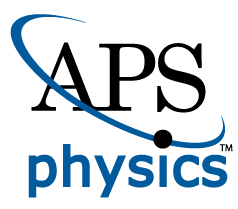Plenary Session
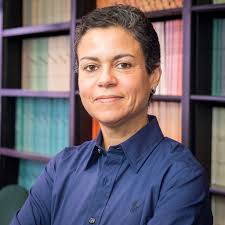 Dr. Kawtar Hafidi, Argonne National Laboratory
Dr. Kawtar Hafidi, Argonne National Laboratory
Leader, Professional Skills Workshop
Kawtar Hafidi is the Associate Chief Scientist for Laboratory Directed Research and Development at Argonne National Laboratory. She is an experimental nuclear physicist in Argonne’s Physics Division with more than 17 years of experience in conceiving and conducting fundamental research.
Dr. Hafidi received her PhD from the University of Paris XI in France in 1999. Her research interests focus on the study of the structure of nuclear matter in terms of its most fundamental constituents, namely quarks and gluons. She has previously been on detail assignment to the U.S. Department of Energy Office of Science, Office of Nuclear Physics. She was responsible for the management, oversight, and review of instrument and experiment construction projects in the U.S. and abroad.
Dr. Hafidi has led Argonne’s Women in Science and Technology program and was chair of the American Physical Society’s Committee on the Status of Women in Physics. Her numerous awards and recognition include the U.S. Department of Energy Outstanding Mentor Award and the Association for Women in Science (AWIS-Chicago chapter) Innovator Award. Recently, she received the Pinnacle of Education Award by the U.Chicago-Argonne LLC for her efforts to inspire and encourage young women to consider scientific careers and the Argonne National Laboratory Diversity Award.
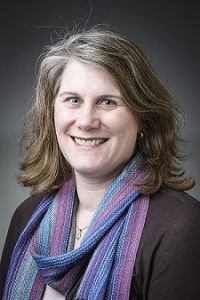 Dr. Jennifer Sheridan, University of Wisconsin-Madison
Dr. Jennifer Sheridan, University of Wisconsin-Madison
Leader, Implicit Bias Workshop
Jennifer Sheridan is the Executive and Research Director of the Women in Science and Engineering Leadership Institute (WISELI) at the University of Wisconsin-Madison. Dr. Sheridan received her PhD from the Department of Sociology at UW-Madison in August 2001, specializing in social stratification and quantitative research methods. Her graduate work focused on the social origins and implications of occupational sex segregation. Her publications cover topics such as measurement of occupational standing, long-term effects of childhood abuse, and her current line of inquiry, the status of women in science and engineering. As WISELI’s executive and research director, Dr. Sheridan develops and oversees the workshops and grant programs administered by WISELI, as well as the research and evaluation produced by WISELI including five waves of the Study of Faculty Worklife climate surveys. She is a member of the WISELI team that is nationally-recognized for educating faculty about unconscious/implicit bias in academic settings, including the hiring process. The WISELI team designed and has delivered over 100 faculty workshops related to implicit bias on the UW-Campus since 2004, and has delivered workshops or talks on the topic to over 40 campuses or groups of campuses outside UW-Madison since 2005.
Parallel Session
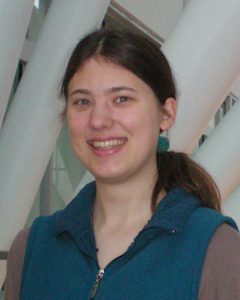 Robin Bjorkquist, Cornell University
Robin Bjorkquist, Cornell University
Leader, LGBTQ+ Roundtable
Robin Bjorkquist is a graduate student in the physics department at Cornell University. She works on the Muon g-2 experiment, a precision particle physics experiment currently under construction at Fermilab. Robin graduated from Reed College with a BA in physics in 2009. Before coming to Cornell, she spent two years working as the Associate Director of the Reed Research Reactor (the only nuclear reactor in the world run primarily by undergraduate students!). Robin first attended CUWiP as an undergraduate in 2009. Since then, she has returned several times in various roles, as a conference organizer, panelist and workshop leader. She also works with Out in Science, Technology, Engineering and Mathematics (oSTEM), an organization that supports LGBTQ+ students in STEM fields with chapters at more than 50 universities. Robin currently serves as the Director of the oSTEM Committee on Women.
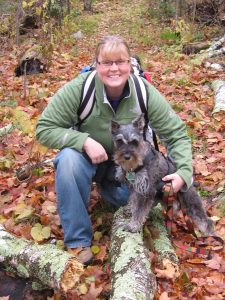 Creanna Cote, University of Wisconsin-Eau Claire
Creanna Cote, University of Wisconsin-Eau Claire
Leader, Building Support Networks Workshop
Creanna Cote is currently an Academic Advisor at the University of Wisconsin-Eau Claire, working with students in the Life and Health Sciences and the Advisor for UW-Eau Claire’s Women in STEM Student Organization (WiSTEM). Creanna is no stranger to the sciences, earning a bachelor’s of science degree in Biology and Environmental Science and Women’s Studies from the UW-Eau Claire and continuing her education examining Feminist Science and Traditional Ecological Knowledge for her Masters of Liberal Studies at the University of Minnesota. Creanna has been working on issues of equity in STEM since her time as an undergraduate at UW-Eau Claire and joins CUWiP to help facilitate a session about how to bring the momentum and energy from the conference back to your campus.
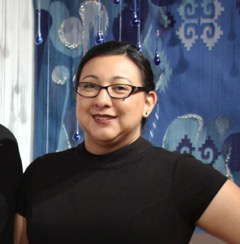 Dr. Audra Hernandez, University of Wisconsin-Madison
Dr. Audra Hernandez, University of Wisconsin-Madison
Leader, Applying to Graduate Schools and Fellowships Workshop
Audra Hernandez, PhD, is an Assistant Scientist in the Department of Astronomy at the University of Wisconsin-Madison. Her research interests include the initial conditions of massive star and star cluster formation, including the physical conditions, dynamics, and formation of Infrared Dark Clouds (IRDCs). Audra came to UW-Madison as a postdoctoral researcher in 2011, studying galactic filaments and the metallicities of the gaseous Milky Way halo with Dr. Bart Wakker. She was promoted to an Assistant Scientist in 2014 and is now supported by the NSF, leading studies on how molecular filaments influence Galactic star formation. Audra received her PhD at the University of Florida in 2011. She is a very active volunteer with the McNair Scholars Program on campus and is a SACNAS LPSLI 2016 alumna.
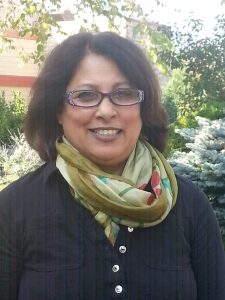 Maya Holtzman, University of Wisconsin-Madison
Maya Holtzman, University of Wisconsin-Madison
Leader, Applying to Graduate Schools and Fellowships Workshop
Bharati (Maya) Holtzman is the Associate Director of the McNair Program at the University of Wisconsin-Madison, where she provides academic support and career counseling to help support undergraduates, especially students of color, first-generation students, low-income students, LGBTQ+ students, and veterans in their goal of successfully entering and completing their PhD studies. She has expertise in helping students optimize their applications for graduate schools and for fellowships. She initiated the GradAllies program, which focuses on building community for new graduate students and helping them acclimate to the university environment. At the national level, she has worked with the Council of Graduate Schools and Council for Opportunities in Education partnership group to improve data on graduate education, degree completion, and post-degree trajectory, with a focus on McNair Scholars.
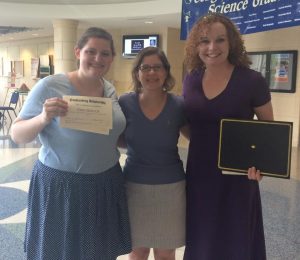 Rachael Lancor, Edgewood College
Rachael Lancor, Edgewood College
Leader, Scientific Presentation Workshop
Rachael Lancor (pictured here, center, with two of her students) has a MS in Physics from the University of Rochester and a PhD in Science Education from the University of Wisconsin-Madison. She has extensive experience in scientific outreach and teaching, and has served as a Preceptor (teaching postdoctoral scholar) in the Department of Physics at Harvard University. Rachael is an Associate Professor in the Department of Chemistry, Geoscience, and Physics at Edgewood College in Madison, where she teaches courses in physics and science education.
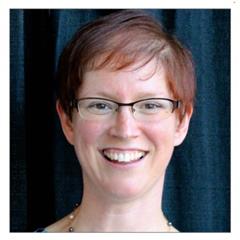 Maureen Muldoon, University of Wisconsin-Madison
Maureen Muldoon, University of Wisconsin-Madison
Leader, How do I Enter the Workforce with a Bachelor’s in Physics/Engineering? Workshop
Maureen Muldoon is a Career and Internship Specialist with the Letters and Science Career Initiative and Career Services at the University of Wisconsin-Madison. She has an M.Ed. in College Student Services Administration from Oregon State University. She has experience with AmeriCorps and she taught English through the Japan Exchange and Teaching Program in Hokkaido for two years.
Her specialties include industry trends in Healthcare and Wellness, Environment, Natural Resources and Wildlife, and Scientific Product Development, Information, and Research. She brings an extensive background in international and service based experiential learning to her passion of working with students in advising, job search skills development, program coordination, group facilitation, presenting, and intercultural communications.
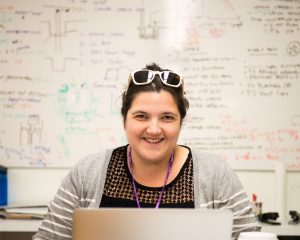 Prof. Kimberly Palladino, University of Wisconsin-Madison
Prof. Kimberly Palladino, University of Wisconsin-Madison
Leader, Scientific Presentation Workshop
Kimberly Palladino is an Assistant Professor of Physics at the University of Wisconsin-Madison. She worked on Cosmic Microwave Background experiments as an undergraduate at Princeton University before taking a gap year in Anchorage, AK working for the American Red Cross through AmeriCorps. She attended graduate school at the Ohio State University where her PhD thesis experiment was in the field of ultra-high energy astrophysical neutrinos; the ANITA detector is a balloon flown from McMurdo base in Antarctica. She then switched fields to work in direct dark matter detection, currently working on the LUX and LZ detectors located at the Sanford Underground Research Facility in South Dakota, and has in the past worked on the MiniCLEAN experiment at SNOLab in Sudbury, Ontario, Canada with past employment at MIT, SNOLab and the SLAC National Accelerator Laboratory. Her focus is on detector hardware, although in the field of direct dark matter detection there is broad experience for most researchers including in Monte Carlo simulations, calibrations and analysis. This fall she became a mom to Adam, who has already been able to attend his first Department of Energy Review!
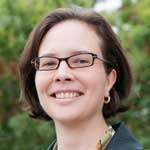 Dr. Monica Plisch, American Physical Society
Dr. Monica Plisch, American Physical Society
Leader, Activating Your Best Self for Student Success Workshop
Leader, LGBTQ+ Round Table
Monica Plisch is the Director of Education and Diversity for the American Physical Society (APS). She leads the Physics Teacher Education Coalition (PhysTEC) project, a national effort to address the severe shortage of qualified high school physics teachers. Monica also leads efforts to increase diversity and inclusion in physics graduate education and is project director of the Inclusive Graduate Education Network (IGEN), a NSF INCLUDES pilot project. She led the development of the Physics Research Mentor Training curriculum and leads workshops for research mentors. Her department recently launched the National Mentoring Community and serves as the administrative home of the Conferences for Undergraduate Women in Physics (CUWiP). Dr. Plisch served as the APS staff liaison for the ad hoc Committee on LGBT Issues, which produced an influential report, LGBT Climate in Physics. She was elected an APS Fellow in 2016. Before coming to the APS, she led nanoscience education initiatives at Cornell University. She completed her doctoral studies in physics at Cornell and her undergraduate degree in engineering physics at the University of Illinois in Urbana-Champaign.
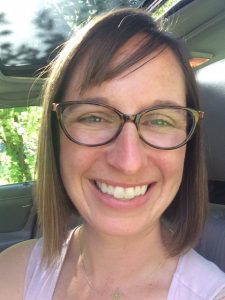 Dr. Amber Smith, University of Wisconsin-Madison
Dr. Amber Smith, University of Wisconsin-Madison
Leader, Activating Your Best Self for Student Success Workshop
Amber Smith, PhD is the Director of Mentor and Mentee Training at the Wisconsin Institute for Science Education and Community Engagement (WISCIENCE) at the University of Wisconsin-Madison. After completing her doctoral studies in Plant Breeding Plant Genetics at UW-Madison, Dr. Smith spent two years as an instructional consultant at the Center for Research on Teaching and Learning (CRLT) at the University of Michigan. In her current position, she works to broaden access for STEM students to participate in undergraduate research by helping students to find research opportunities and providing professional development through the Entering Research courses and and workshops at the BioCommons. Dr. Smith also oversees the Research Mentor Training Progam at UW-Madison and directs the Biological SIGNALS Summer Research Program for undergraduate researchers.
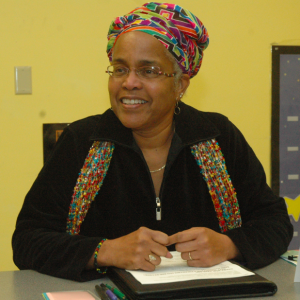 Dr. Hazel Symonette, University of Wisconsin-Madison
Dr. Hazel Symonette, University of Wisconsin-Madison
Leader, Activating Your Best Self for Student Success Workshop
Dr. Hazel Symonette serves as Program Development & Assessment Specialist in the University of Wisconsin-Madison Division of Student Life. She is the founder and director of a year-long cross-campus/cross-role community of practice, the Student Success Institute. Hazel is a very active leader within the national & international diversity, equity and social justice community and within the professional evaluation community via the American Evaluation Association and the Joint Committee on Standards for Educational Evaluation. For seven years, she facilitated the implementation of the first statewide diversity strategic plan for public higher education, the University of Wisconsin System’s Design for Diversity, and later returned to the UW System to serve on the leadership team for the pilot implementation of the Equity Scorecard.
Hazel prioritizes the use of assessment and evaluation as a participant-centered, self-diagnostic resource for continuous improvement, developmental innovation and strategic image management. She moves this agenda forward through cultivating capacities for using multi-level assessment/evaluation processes that advance a diversity-grounded, equity-minded personal transformation, organizational development and social justice change agenda. Her passion lies in expanding the cadre of student success champions who embrace activist evaluative thinking and praxis across the full spectrum of program design and development efforts. Among her many accolades, she was a recipient of the 2014 Madison City-County Reverend Dr. Martin Luther King, Jr. Humanitarian Award.
